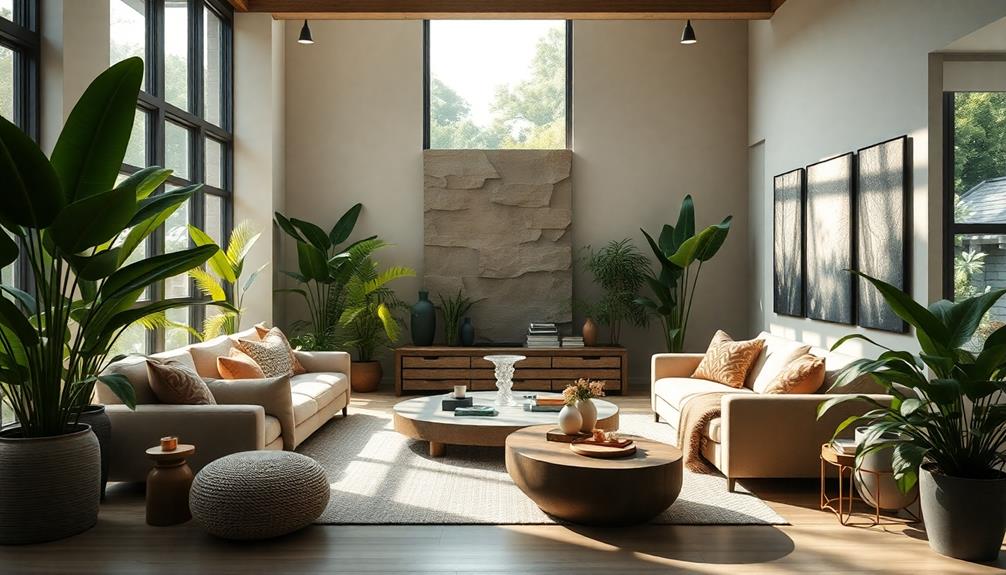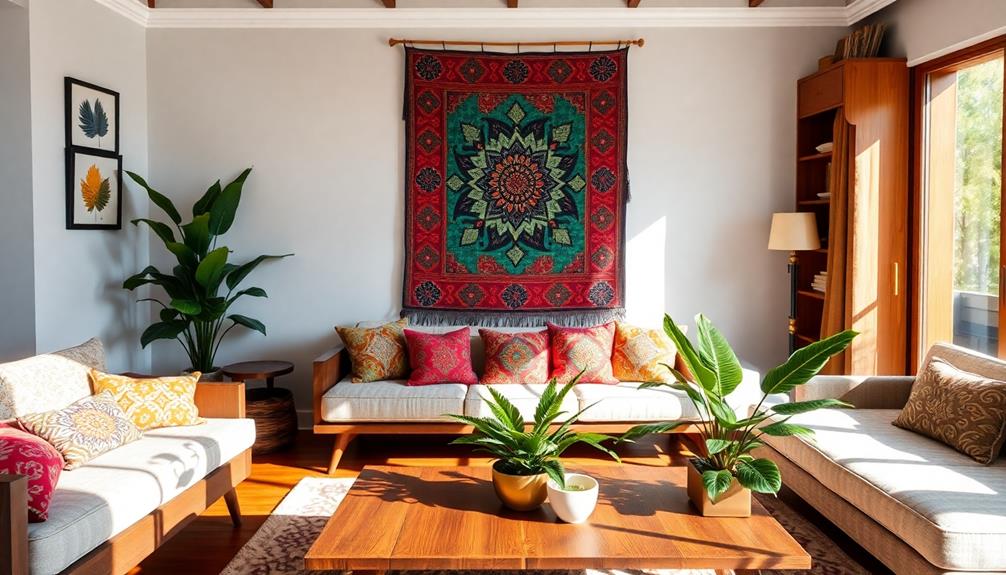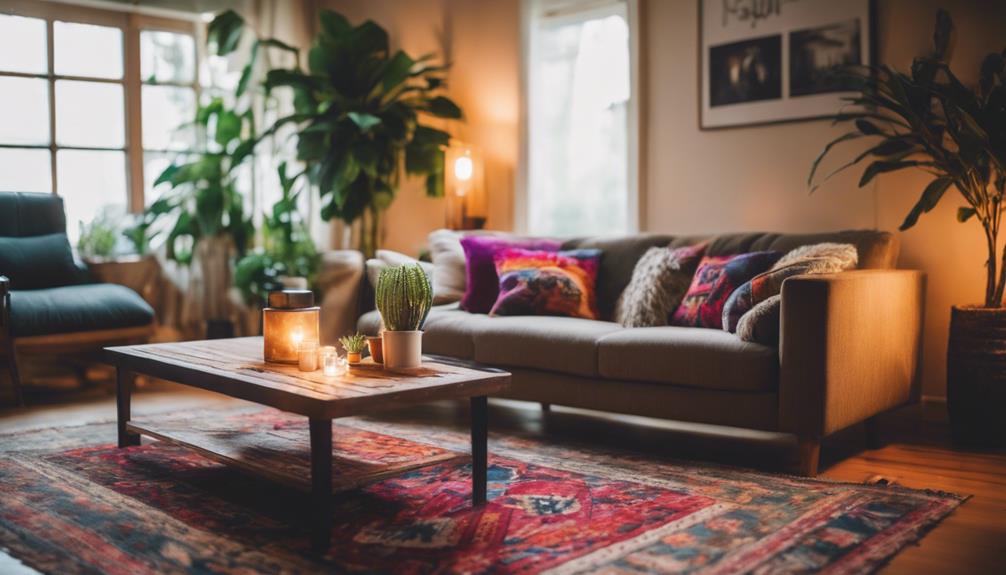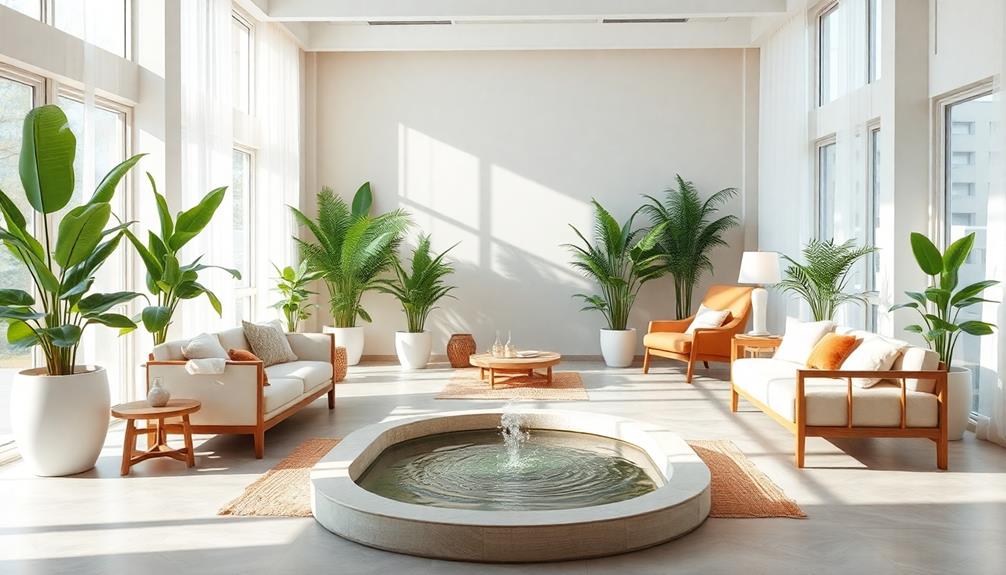If you want a harmonious home, embracing Feng Shui is a game changer. It enhances the flow of positive energy, or chi, creating a tranquil atmosphere. By incorporating natural elements and balancing the five elements of nature, your space becomes a haven for relaxation and well-being. Strategic room arrangements boost comfort and connection, while decluttering clears your mind. Using the Bagua Map helps you align your environment with your personal goals, promoting prosperity in key life areas. You'll discover that even small adjustments can create big impacts, and there's so much more you can explore to achieve balance and harmony.
Key Takeaways
- Feng Shui enhances positive energy flow, creating a harmonious atmosphere that improves overall well-being and comfort in your home.
- Incorporating the Five Elements fosters balance, ensuring that your space supports various aspects of life, like health and prosperity.
- Mindful decluttering and space management boost mental clarity, allowing for a more peaceful and rejuvenating environment.
- Strategic room arrangement and natural elements connect you to nature, promoting tranquility and enhancing your living experience.
- Engaging with Feng Shui principles encourages mindfulness and intentionality, leading to a more fulfilling and harmonious lifestyle.
Understanding Feng Shui Principles
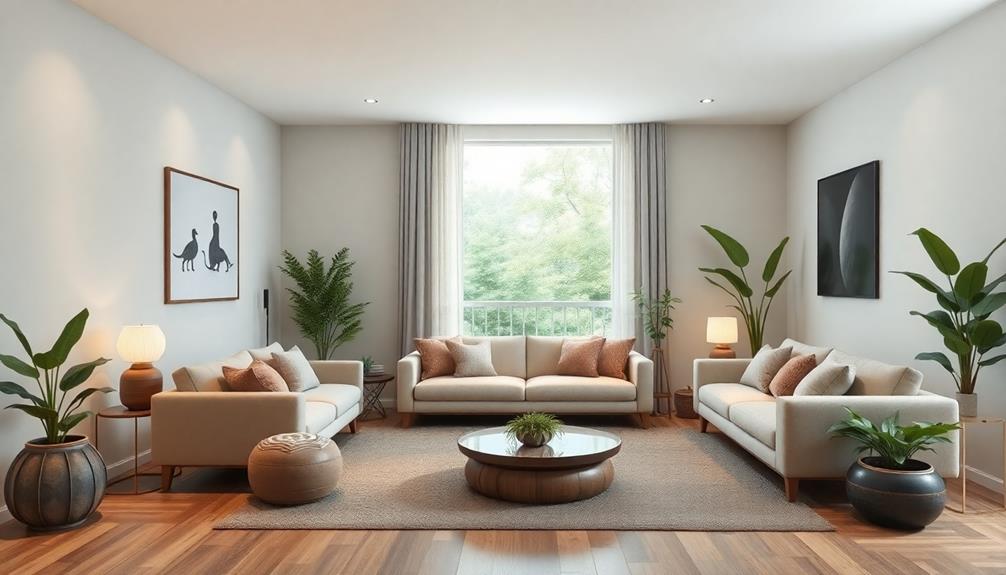
What makes Feng Shui such a vital practice for creating a harmonious home? At its core, Feng Shui focuses on the flow of energy, or chi, in your space. By understanding its principles, you can enhance this energy flow and cultivate a balanced environment.
One of the key tools is the Bagua Map, which helps you identify areas of your life—like wealth and health—within your home. Incorporating elements like Indonesian decorative pillows can add vibrant colors and intricate patterns that not only enhance the aesthetics but also promote a sense of comfort and cultural heritage.
Incorporating the Five Elements—wood, fire, earth, metal, and water—into your decor allows you to create a dynamic equilibrium. Achieving balance between Yin and Yang is important; the calm, soft energies should complement the active, bright ones.
Decluttering plays a significant role in this practice, as it clears away stagnant energy, promoting mental clarity and improving the overall flow of positive energy throughout your home.
Additionally, integrating natural elements can enhance your space, supporting both good health and a sense of peace. By applying these principles, you're not just creating a beautiful space; you're fostering a truly harmonious home that nourishes your well-being.
Choosing a Harmonious Home
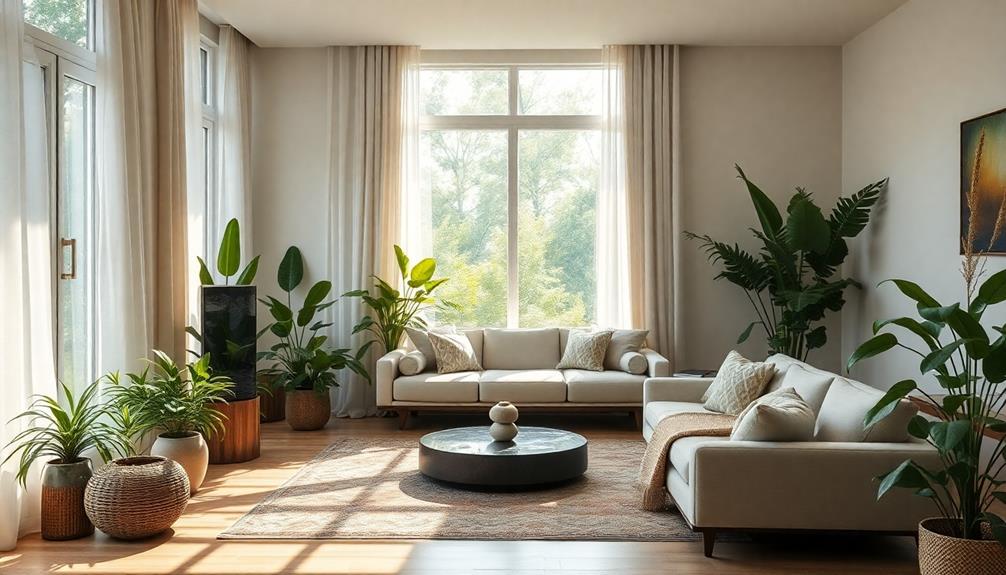
Choosing a harmonious home involves careful consideration of various factors that influence the flow of energy within your living space. When it comes to Feng Shui, a well-designed floor plan is essential for promoting positive chi circulation.
You'll want to prioritize deeper floor plans, as they typically support better energy flow compared to wider structures, fostering an environment conducive to harmonious living. Incorporating unique decor elements, such as a Face Indonesian Decor Mask, can enhance the aesthetic appeal while reflecting cultural heritage.
Pay attention to key features like ceiling height and bathroom placement; these can greatly impact the energy of your space. Comfortable ceiling heights and thoughtfully located bathrooms enhance your overall well-being.
Engaging with Feng Shui experts during your home selection process can offer invaluable insights into how a potential home's design aligns with natural energy flow and meets your personal needs.
Utilizing the Bagua Map can be particularly helpful in evaluating a home. It allows you to identify areas of focus for prosperity, relationships, and overall harmony.
Key Areas for Feng Shui
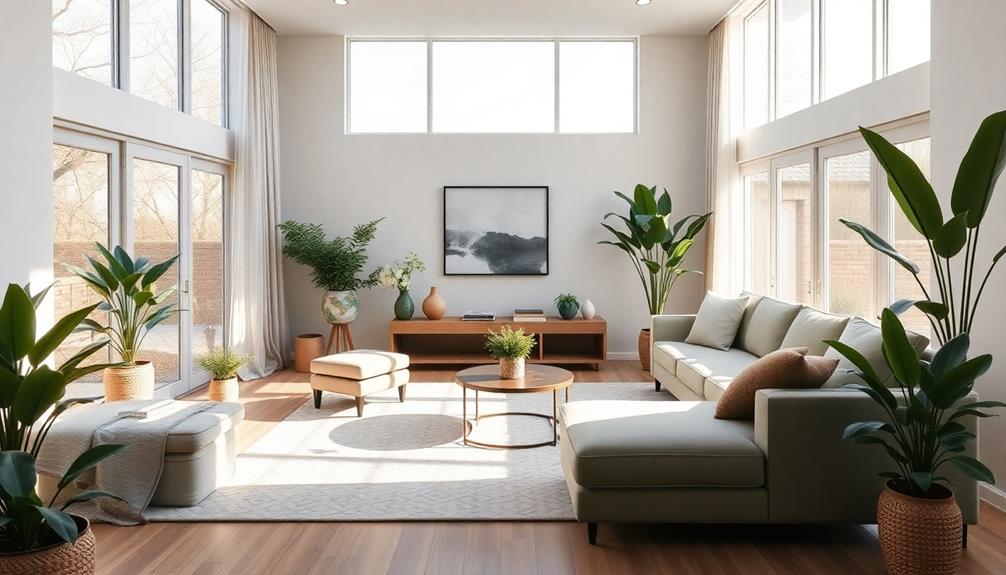
When you think about key areas for Feng Shui, consider how energy flows through your home and the layout of your spaces.
By creating open pathways and thoughtful arrangements, you can enhance the positive energy in each room. Incorporating elements of Balinese design characteristics can further amplify this energy by promoting a connection to nature and using natural materials.
Let's explore some practical strategies to optimize your home's energy flow.
Energy Flow Principles
To create a harmonious home, understanding the energy flow principles of feng shui is crucial. The concept of Chi, or energy flow, is central to feng shui, emphasizing how a well-designed space can enhance your overall well-being.
Incorporating natural materials like wood and bamboo, as seen in traditional Indonesian style home decor, can further enhance the energy flow in your living spaces. Start by ensuring your main doors are clear and clutter-free. This simple step allows for ideal energy circulation, promoting good energy, health, and prosperity.
Utilizing the Bagua Map is essential in identifying which areas of your space correspond to specific life aspects. This tool helps you target enhancements that improve energy flow and align with your personal goals.
Space Layout Strategies
Effective space layout strategies are vital for optimizing feng shui in your home. You should prioritize a deeper floor plan over a wider structure to encourage positive energy flow throughout your living space.
When considering furniture placement, make sure that pathways remain unobstructed, allowing chi to circulate freely without blockages. This is significant for maintaining a clutter-free environment, especially in entryways, as they symbolize the flow of opportunities and energy entering your home.
Additionally, drawing inspiration from cultural elements, such as Indonesian wedding decor ideas, can enhance the aesthetic and energy of your space, promoting a harmonious atmosphere.
Also, pay attention to your room layout and ceiling heights; high ceilings can create a sense of openness in larger rooms, while lower ceilings foster coziness in smaller spaces.
In the bedroom, consider diagonal bed placement, which enhances energy flow and promotes a sense of security and relaxation, aligning with traditional Chinese philosophy.
Decorating for Balance

Creating a balanced environment in your home can greatly enhance your overall well-being. To achieve this, focus on incorporating Feng Shui principles that promote harmony and positive energy. Start by bringing in natural elements like plants and water features, which enhance energy flow and foster a sense of calm.
Utilizing mirrors strategically can also amplify light and positive energy, but be mindful of their placement to avoid disrupting the flow of chi. Aim for symmetry in your decor; matching nightstands in bedrooms can create stability and balance in your spaces.
Adjusting your color palette plays a vital role as well. Calming colors like blues and greens promote tranquility, while limiting excessive reds can help reduce anxiety. Finally, regular decluttering is essential for maintaining balance; removing items that no longer serve you can greatly improve energy flow.
Here's a quick reference table to help you create balance in your home:
| Element | Purpose |
|---|---|
| Natural Elements | Enhance energy flow |
| Symmetry | Create stability and harmony |
| Color Palette | Influence mood and tranquility |
Mindful Space Management
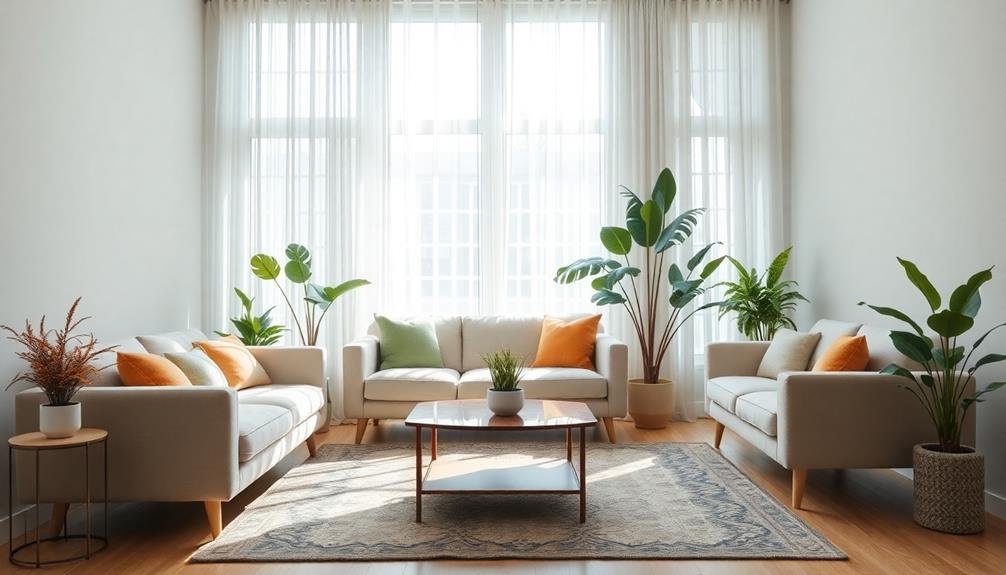
Maintaining balance in your home sets the stage for mindful space management, which focuses on how you can optimize your environment for well-being. In Feng Shui, decluttering is essential as it promotes mental clarity and allows positive energy, or chi, to flow freely throughout your space.
By regularly evaluating what you keep, you can rejuvenate your home and create a serene atmosphere.
Small, intentional changes can also transform your environment. Rearranging furniture or incorporating natural elements like wood, water, and plants can create a balanced environment that supports emotional well-being.
These elements help foster a deeper connection to nature and enhance the overall vibe of your personal space.
Reflect on the items in your home. If something no longer serves a purpose, consider letting it go. This practice not only clears physical space but also cultivates a harmonious home.
By adopting mindful space management techniques, you create a supportive setting that nurtures your spirit and invites positive energy into your life.
Embrace these principles, and watch how your living space evolves into a more vibrant and inviting sanctuary.
Simple Practices for Harmony
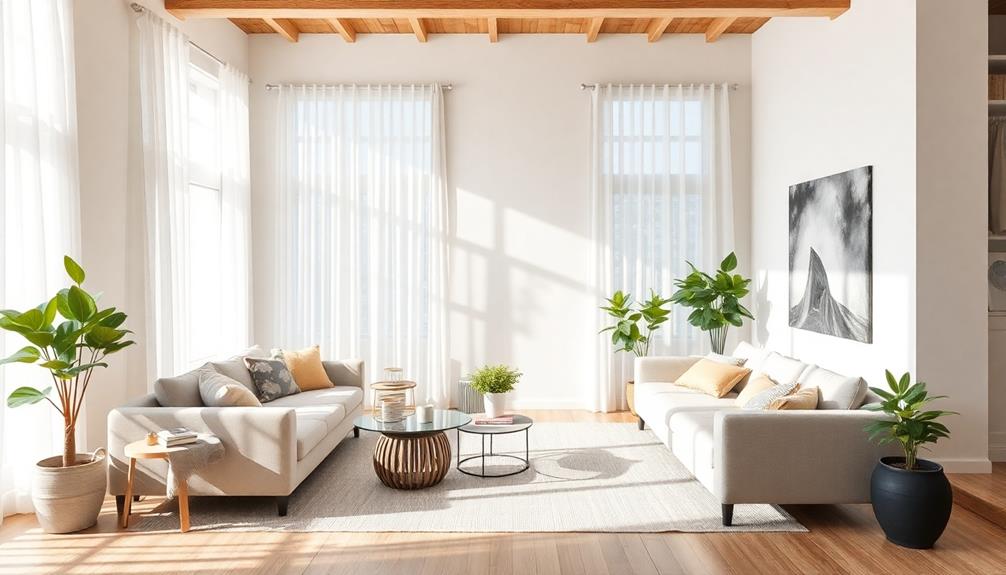
Achieving harmony in your home doesn't have to be complicated; simple practices can make a significant difference. Start by decluttering your space—consider releasing nine items over nine days. This mindful adjustment creates a positive energy shift that promotes balance.
Next, rearranging furniture can enhance the flow of energy. Make sure your seating allows for conversation and connection, improving comfort and chi.
Incorporate natural elements, like plants or wooden materials, to strengthen your connection to nature. These additions not only beautify your space but also foster a calming atmosphere.
Use calming colors—soft earth tones, for example—to create a tranquil environment conducive to relaxation.
Don't forget the importance of fresh air and natural light. Regularly open your windows to invite in these elements, enhancing the energy flow while boosting both physical health and emotional well-being.
Frequently Asked Questions
What Is the Best Feng Shui Orientation for a House?
The best feng shui orientation for your house is south-facing, as it attracts positive energy and sunlight. If you can, consider east for morning light, or north for a calming environment, ensuring unobstructed surroundings.
How to Arrange Your Home According to Feng Shui?
For a fabulous feng shui setup, start by strategically situating your bed, clearing cluttered corners, balancing the five elements, and embracing your entryway. These steps invite invigorating energy, promoting peace and positivity throughout your home.
What Is Bad Feng Shui for a House?
Bad feng shui for your house includes blocked entryways, cluttered spaces, and poor bed placement. Excessive red decor can increase stress, while dark rooms may leave you feeling uneasy and drained. Keep your spaces balanced and welcoming.
When Should I Move My House Feng Shui?
If you're feeling stuck after a major life change, like starting a new job, it's time to contemplate moving. Feng Shui suggests that a fresh space can help restore balance and promote positive energy flow.
Conclusion
Embracing feng shui isn't just about aesthetics; it's about creating a sanctuary that nurtures your spirit. By integrating these principles into your design choices, you're inviting balance and harmony into your life. Just think—what if your home could be a reflection of peace and positivity? With thoughtful arrangements and mindful practices, you can transform your space into a haven that rejuvenates your mind and soul. So, why not take that step toward a more harmonious home today? Start by exploring simple feng shui tips for homeowners, such as decluttering to allow energy to flow freely and incorporating natural elements like plants or water features to foster a sense of tranquility. Small changes, like adjusting furniture placement to encourage movement or bringing in calming colors, can make a big difference. Remember, each tweak you make brings you closer to a space that not only looks beautiful but also feels deeply restorative.
